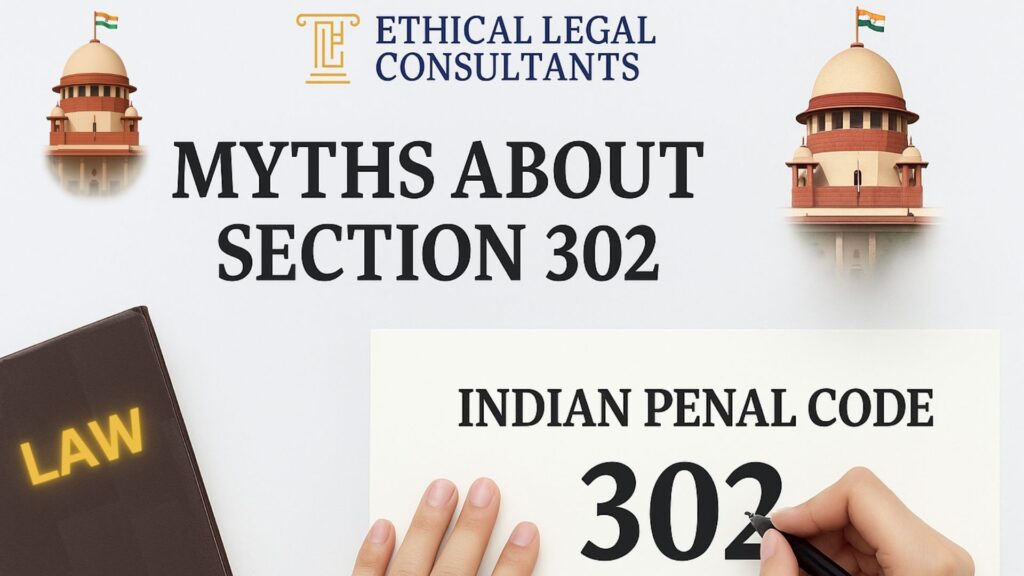
Section 302 of the Indian Penal Code (IPC) is one of the most critical provisions in Indian criminal law, prescribing punishment for the offense of murder. Despite its significance, numerous myths and misconceptions surround this section. In this article, we aim to debunk eight common myths about Section 302 of IPC, providing clarity and accurate information.
Myth 1: Section 302 IPC Always Leads to the Death Penalty
Reality: While Section 302 IPC stipulates that anyone committing murder shall be punished with death or life imprisonment, the death penalty is not mandatory. Courts often reserve the death sentence for the “rarest of rare” cases, considering factors like the nature of the crime and the circumstances involved. The Supreme Court stated that “ The Life Imprisonment is the rule, Death penalty is the exception” in the case Raju Jagdish paswan v. The state of Maharashtra AIR 2019 SUPREME COURT 897.
Myth 2: Bail Is Impossible Under Section 302 IPC
Reality: Section 302 IPC is a non-bailable offense, meaning bail is not a right but can be granted at the discretion of the court. Courts may consider granting bail based on the specifics of the case, evidence presented, and the accused’s background. The Magistrate’s power to grant bail in Section 302 cases is subject to the provisos of Section 437 of the Criminal Procedure Code (CrPC), which allows for bail in certain circumstances, such as when the accused is under 16 years old, a woman, or sick or infirm. PRADEEP RAM VS STATE OF JHARKHAND – Supreme Court.
Myth 3: A Single Blow Cannot Constitute Murder Under Section 302 IPC
Reality: The Supreme Court has clarified that even a single injury can lead to a conviction under Section 302 IPC if it is sufficient in the ordinary course of nature to cause death. The intent and circumstances play a crucial role in such determinations. Hence, the High Court held that there was no infirmity in order framing charge against the Revisionist u/s 302 IPC. A Single Judge Bench of Justice Jasmeet Singh observed that “It is extremely plausible for a person to die due to a single blow. Nowhere is it stated that the offence u/s 302 IPC must constitute the infliction of multiple blows or extensive bodily harm upon an individual”.
Myth 4: Section 302 IPC Applies Only to Premeditated Murders
Reality: Section 302 IPC covers all acts of murder, whether premeditated or not. Even spontaneous acts leading to death can fall under this section if the intent to cause death or knowledge that the act is likely to cause death is established. In the case of Hari Om v. State of Uttar Pradesh (1993), it was held that it is not necessary that there must be a prior conspiracy or pre-meditation, the common intention can be formed in the course of the occurrence as well.
Myth 5: Minors Cannot Be Tried Under Section 302 IPC
Reality: Minors can be charged under Section 302 IPC; however, they are tried under the Juvenile Justice Act. The Act provides for a separate legal framework focusing on reformative measures rather than punitive ones. according to the Juvenile Justice Act, the offence of murder committed by a juvenile will be examined and find out whether he/she has completed fifteen years of life or not.
Myth 6: Section 302 IPC Is No Longer Applicable Due to Legal Reforms
Reality: While there have been discussions and proposals to reform and replace certain sections of the IPC, including Section 302, it remains in force as of now. Any changes would require formal legislative processes and notifications.
Myth 7: Intent Must Be Proven Beyond Doubt for Conviction Under Section 302 IPC
Reality: While intent is a critical component, courts also consider the knowledge of the act’s consequences. If it is proven that the accused had knowledge that their actions were likely to cause death, a conviction under Section 302 IPC can still be secured.
Myth 8: Section 302 IPC Cases Are Always Tried in Sessions Courts
Reality: While Sessions Courts typically handle cases under Section 302 IPC due to their severity, the initial proceedings, including the filing of the First Information Report (FIR) and preliminary investigations, occur at the Magistrate level. The case is then committed to the Sessions Court for trial.
Understanding the realities of Section 302 IPC is crucial for anyone involved in or studying the Indian legal system. Misinformation can lead to unnecessary panic or complacency. Always consult with a qualified legal professional for advice specific to your situation.
FOR BEST LEGAL SOLUTIONS
📞 +91 9811341058 / 9717295772
📧 Email: info@ethicallegal.in for a short consultation
Note: This article is for informational purposes only and does not constitute legal advice. For personalized legal assistance, please contact or email to the detail specified above